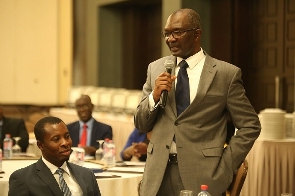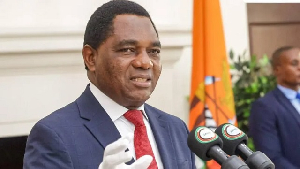The Ghana Employers Association (GEA) has called on government to address the high cost of internet charges to boost the growth of local businesses and promote economic development.
Mr Daniel Acheampong, President of the GEA, said the high cost of internet, coupled with low access to Information and Communication Technology (ICT) tools, were great discouragement to businesses who would want to leverage on technology to drive productivity amid the COVID-19 pandemic.
He said even though the country's economy had made significant progress in spite of the pandemic, the high cost of internet remained a challenge to businesses and the country at large to ensure a full recovery from the economic shocks.
Mr Acheampong said this at the Association's 60th Annual General Meeting (AGM) held in Accra on the theme: "Revitalising Ghana's Economy Post COVID-19 Pandemic.
"He said 58 percent of respondents, in a recent research conducted by the Alliance for Affordable Internet (A4AI), indicated that the price of internet in Ghana was among the highest on the African Continent.
"This represents a significant barrier for Ghana to leverage on internet and ICT to recover from the disruptions of the pandemic," he said.
Mr Acheampong said government must, therefore, prioritise the development of the country's ICT infrastructure to provide access to competitively-priced, high-speed internet to businesses, workers and the citizenry, irrespective of their location to boost productivity.
He, however, hailed government for implementing a number of economic and social policies, which, he said, had put the country on a strong footing towards macroeconomic management, economic growth and employment creation, prior to the outbreak of the COVID-19.
He said the implementation of those policies would put the economy on the path of sustained growth and driven the her towards the realisation of the "Ghana Beyond Aid," agenda.
Ghana's economy growth rate over the last two decades averages between five and six percent.
In 2019, the country attained an improved growth rate of 6.8 percent, one of the highest rates for any Sub-Saharan African country at the time.
The 2020 Budget Statement revealed that the growth of Ghana's Gross Domestic Product may decline from 6.8 percent to 2.6 percent by end of year 2020.
Mr Acheampong, while pledging the Association's continued support to ensuring total recovery from the pandemic, urged government to ensure the effective implementation of the comprehensive economic recovery plan it had outlined by involving all key stakeholders.
Mr Ken Ofori-Atta, the Minister of Finance, said the country was on the road to recovery from the economic shocks due to the pandemic as the numerous interventions by government had begun to yield positive results.
He said data from the Ghana Statistical Service (GSS) on the second-quarter of 2020 indicated that the impact of the covid-19 on growth had been less severe than anticipated.
The GSS data showed that real GDP was 3.2 percent in the second-quarter of 2020 as compared to a growth of 5.7 percent for the corresponding period in 2019.
Mr Ofori-Atta urged the private sector to take advantage of the numerous initiatives government was implementing to boost productivity.
Mr Ignatius Baffour Awuah, the Minister of Employment and Labour Relations (MELR), said government had acknowledged the concerns of workers and employers and would address them with the measures being put in place.
He commended the GEA for the immense support towards government's fight against the COVID-19 pandemic.
Business News of Sunday, 25 October 2020
Source: GNA













